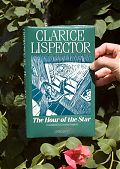
Clarice Lispector
The Hour of the Star
Some books have first lines that slip through memory as one slips through the greater book. Rare is the first line that sticks so securely, to become the best way to spark remembrances of the insides. The Hour of the Star falls headlong into the latter. The first line:
Everything in the world began with a yes.
Third line:
But before prehistory there was the prehistory of prehistory and there was the never and there was the yes.
Upon reading lines like these I must stop and catch my breath, winded before the race even begins. Maybe it was the unctuous substance of these lines that allowed The Hour of the Star to pass time unread on my shelf. Those lines predict exactly what the reader is getting into.
Right away, like a rocket, Clarice Lispector had me enthralled. Whether it was her language that drew so simply and so fitting an unforgettable character, or the svelte size of the book itself, who knows? Between the two hard covers the pages passed like butter.
At first I called this book condensed. But after a few pages I began to think of it as the book that writes itself. Through the narrator, a Rodrigo S.M., Clarice Lispector brings the reader as close as one can get, to the writing. I’m very keen on this. It’s like spying on a process usually hidden; I’m allowed to get down and stare. Conception: I caught a glimpse of perdition on the face of a girl from the North-east. The drum-roll of getting started, of working one’s self up for the long haul, the curiosity of creation, then Bang! the story takes off.
The narrator is the beginning, thoughts on beginning and on the uneasiness caused by the character herself. As the story goes on, giving way almost imperceptibly—but for the bangs—the narrator’s relationship to his work is what binds it. Intermittent parentheses are the writer’s questioning thoughts. Many questions: on the validity of writing and the frustration of not being able to do more; many insights: into the relationship between character and writer, especially with a character such as Macabéa. The narrator often expresses helplessness, the writing being no longer in his control, that the words come out unbeknownst to himself, independent of me. From where?
I am amazed at my own perception of truth. Can it be that it’s my painful task to perceive in the flesh truths that no one wants to face?
In many ways, for me, Rodrigo is the perfect narrator, for I am always thrilled when the writer shows herself, albeit behind a translucent veil. And translucent this veil surely is for I had a really tough time being convinced that the narrator was male. Perhaps a woman may weep her heart out but I must believe that Clarice Lispector didn’t. Perhaps Rodrigo was her distance from the sadness of Macabéa’s story; her distance never too distant. I am convinced that the story of Macabéa was one only a woman could tell.
She believed in everything that existed and in everything non-existent as well. But she didn’t know how to embellish reality. For her, reality was too enormous to grasp.
Macabéa, born from a glance, a girl at a market from the North-east of Brazil, come to Rio de Janeiro like a piece a dust is blown about a room. She has no future, no self, no ability to reflect back on the self, to see what makes her her and so she exists much like a dog. With nothing else to do but live, her life is all she has. The only thing she desired was to live.
She is happy because happiness seems to be required. She doesn’t know how bare her life actually is or what is meant by sad. Everyday of her life is out in the open. She does not know how to protect herself, for protect herself against what? Poverty, a menial job, no entertainment, punishments from an aunt. If she were to ask: What is this life? She would respond, it is so because it is so. Clarice Lispector has cut existence down to bare sparsity. Macabéa’s life is like the words of Lispector’s text.
I have grown weary of literature: silence alone comforts me. If I continue to write it is because I have nothing more to accomplish in this world except to wait for death. Searching for the word in darkness.
Silence. It hangs among the margins, the only comfort. Silence and a “scrawny man” playing the fiddle. The book seems to return to where it came. Silence to silence. Never and yes.
(I am eager to read another of Clarice Lispector’s books.)
· · · · · · · · · · · · · · · · · · · ·